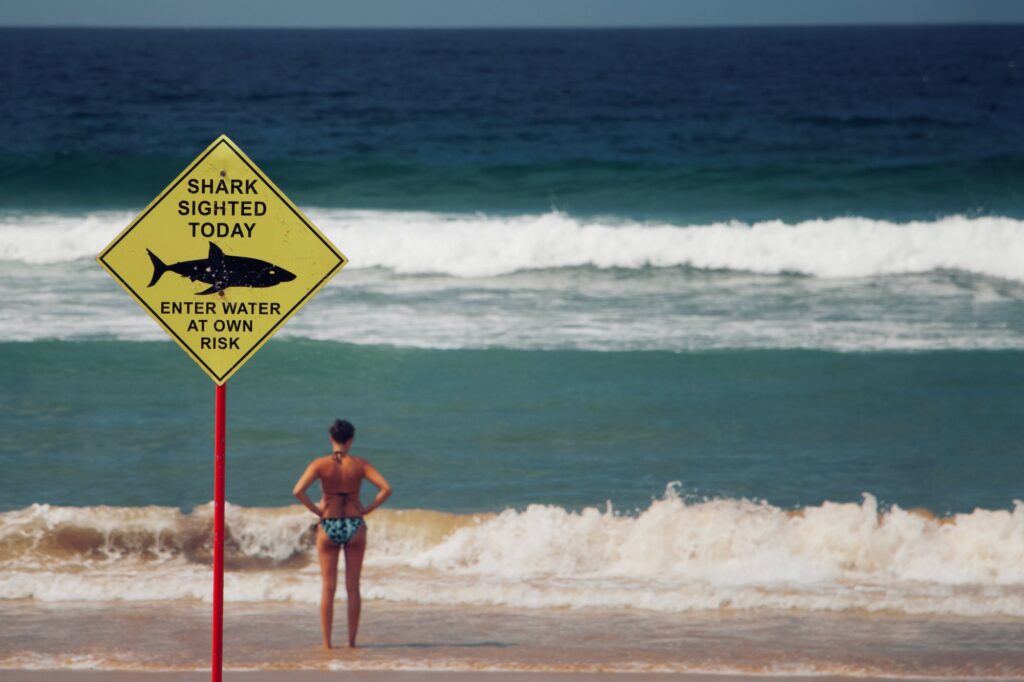Are Surfers Scared of Sharks?
Sharks are one of the ocean’s most feared creatures. And for good reason – they can be deadly if you stumble upon one.
But while sharks may be intimidating, they shouldn’t keep surfers from hitting the ocean. In fact, you’re more likely to get injured surfing than you are swimming near a shark.
However, if you are afraid of sharks, you are in good company. Many people do and actually, this fear shows how wise you are. Nobody wants to die, we want to be aware of potential dangers in the ocean.
So, the question becomes, are surfers afraid of sharks?
The answer may surprise you. While some surfers do have a healthy respect for these apex predators, others don’t give them a second thought.
Depending on the surfer’s experience and passion for surfing, the answer may vary. Many people who live near the ocean have a general understanding of shark behavior and know that they are more likely to be attacked if they’re surfing alone or near areas where food is abundant.
Of course, there are always going to be exceptions as some people are just plain scared of sharks, no matter what.
But for the most part, surfers aren’t as afraid of these creatures as you might think.
Let’s break down the reasons why some surfers are scared of sharks and how to overcome them. The full answer is in the end, but make sure you read it all. Here we go!
Sharks Are Not Interested In Humans
Sharks have been getting a bad rap. Thanks to movies like Jaws, they’ve been portrayed as man-eating monsters that are out to take a bite out of anything that crosses their path.
However, the truth is that sharks are actually quite shy creatures that are more interested in avoiding humans than attacking them.
While this can be scary for the person involved, it’s usually not aggressive behavior on the part of the shark.
Despite what popular culture might have us believe, sharks are not interested in humans as food.
Some may think that every time a human enters the water, the sharks can smell our blood and they start to circle.
And even though sharks should be respected, the idea that they’re constantly eyeing us up as a potential meal is nothing more than a myth.
As a matter of fact, sharks prefer fat-rich meats to maintain their body temperature and for energy. We’re too bony and don’t have enough fat, we’re simply not their cup of tea.
They have a slow digestive system and are choosy about their diet, which mostly consists of other animals found in the sea, such as turtles, fish, seals, and whales.
Despite their reputation as fearsome predators, the vast majority, 92% to be exact, of shark attacks are actually the result of mistaken identity.
They are curious creatures – when they see something they don’t know, they instinctively take a closer look by taking a bite, just as if we touch something new with our fingers.
So actually, most sharks are not interested in humans and only bite when they mistake us for their common prey, which is not completely relieving since one small bite can cause a serious injury or even worse.
But once realizing its mistake, the shark always retreats and lets go of the victim.
Shark Attacks Are Rare
Even when a mistake happens, it rarely does. Shark attacks are very rare, and most of them occur when a curious shark takes a closer look at a human and decides to give them a nudge or bump (or a bite).
Sharks might not have natural predators but are not aggressive animals and they rarely attack humans.
Shark attacks occur approximately about 100 times each year worldwide, and only a handful of those are fatal. So the chances of being attacked by a shark are pretty low.
With this such a low probability of being attacked by a shark, it became one of the most irrational fears that people have.
In fact, you’re more likely to get injured by your own board than you are to get bitten by a shark.
So why are people still so afraid of sharks? Part of it has to do with media coverage. Every time there is a shark attack, it makes headlines.
But when you consider the millions of people who swim in the ocean each year, the odds of being attacked by a shark are incredibly low.
Not All Sharks Are Even Dangerous
It is wrong to generalize that all sharks are dangerous. Out of the 520 species of sharks, only three have been responsible for unprovoked attacks on humans: Bull Shark, Great White Shark, and Tiger Shark.
The majority of shark species are actually harmless to us. Additionally, some may think the bigger the shark, the more dangerous he is, but that’s incorrect.
In fact, some sharks such as the Basking Shark, Whale Shark, and Megamouth Shark just eat plankton!
What most people don’t know is that sharks play an important role in the ocean’s ecosystem. Let me elaborate.
Sharks’ Role In The Ocean’s Ecosystem
These predators help to keep the populations of other fish in check by preying on weak and sick animals, as they help to keep populations healthy.
Their hunting activities often result in the removal of large amounts of seaweed and other debris from reefs, keeping these areas clean and promoting the growth of new coral.
In addition, sharks play an important role in carbon sequestration. As they move through the water, they stir up nutrients that support phytoplankton growth.
Phytoplankton are a key part of the ocean’s food chain, and they also absorb large amounts of carbon dioxide from the atmosphere.
As a result, sharks play a vital role in keeping our planet healthy.
I’m Not Convinced Yet – How To Stay Safe Surfing In Sharks Area?
Even though the chances of being attacked by a shark are slim, and if you are still unconvinced sharks are not that scary, you can:
- Avoid areas where sharks are known to congregate, such as areas with high concentrations of seals or other prey.
- Make sure you read the signs before you surf. Most of the time, locals know if there are sharks in the water and will post warnings accordingly.
Overcome The Fear of Sharks
Everyday activities like driving to work or crossing the street carry with them the risk of a fatal accident.
In reality, you’re more likely to die from being struck by lightning than from being attacked by a shark.
Other than the facts above, focus on things that will help you relax and enjoy the moment, also when not surfing, like spending time with friends and family, getting outside in nature, or simply taking a few deep breaths.
After all, life is too short to waste any time worrying about things that are out of your control.
Conclusion
So, are surfers scared of sharks? The answer depends on the surfer and vastly on their experience. Most of the time, the more experienced and passionate surfers are simply not afraid of sharks.
The passion and eagerness for great waves overcome anything – even if there is a slight chance a shark will come to visit.
One thing is for sure: Life is unpredictable and anything can happen at any time. So it’s important to appreciate each day and live life to the fullest.



